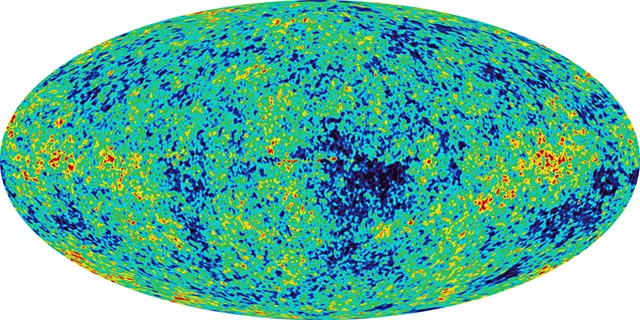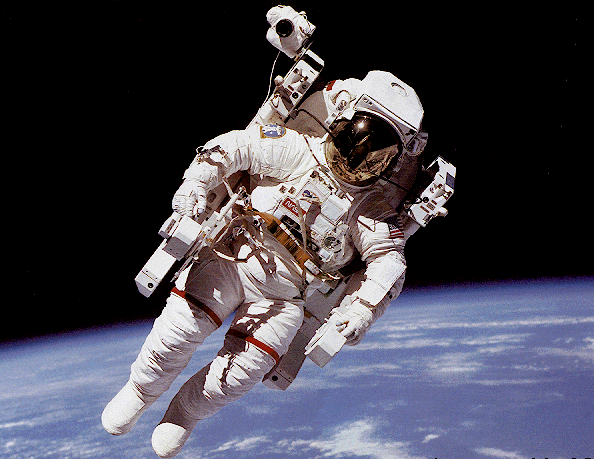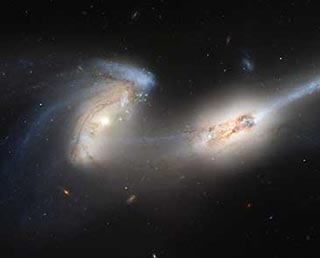
Big news and bold statements are issuing forth from Greenbelt, MD. “We’ve now laid the cornerstone of a unified cosmic theory…We have not answered all the questions. But we’ve certainly turned a corner.” Thanks to NASA and the Wilkinson Microwave Anisotropy Probe (WMAP), scientists now have visual evidence of the universe’s origins with which to test out all the prevailing cosmological theories. Great news! Not only is any new empirical data in this field a boon to science, but, if ridiculous amounts of new information are gleaned from just this one little probe…well, it won’t help NASA in the manned space department, but the agency could still use a few unmitigated victories these days. On another note, looking at this map brings back some old memories. For my high school science thesis (required at SCGSSM), I used similar COBE DMR data to figure out that early galaxies displayed a fractal distribution. (Hey, it was the early ’90’s – fractals were the rage.) I wonder if this new data bears out that old rinky-dink thesis.
Tag: NASA
Infinity and Beyond: The Case for Space
With the foam debris explanation suffering in computer modeling, the fate of the Columbia has become a scientific mystery. I haven’t had the time to address the space question as eloquently as I would have liked this week, so I’ll quit stalling and just repost some of my (slightly-edited) e-mail conversation with Scully on the subject:

I’m actually very much in favor of space colonization, and I think the argument that money spent on space is a senseless waste falls apart on its own premises. Would the money spent on the space program be better spent on conquering disease or ending famine here on Earth? Ideally, of course, we’d spend money doing both – exploring space and alleviating misery. But I think the utilitarian argument being made in this case ultimately doesn’t work. If we’re talking greatest good for the greatest number, then the space program in fact makes more sense. Spending the money on food saves millions. Space colonization would save untold billions, if not more – the very survival of the species, and in fact all of Earth’s species. We know that the sun will wink out of existence one day in the future, and if humankind isn’t out of the solar system by then, it’s game over.
Of course such an event seems very, very far away, and there are people starving and dying in the here and now. It seems callous to weigh the very real suffering of the diseased and famine-stricken against such a farflung possibility. But, the fact is, a wayward asteroid could kill us all in ten years. Or we could burn out the polar caps in one hundred. That’s why, ultimately, space colonization is an imperative. Having all of our eggs in one basket (Earth) may possibly encourage humanity to treat that basket with care (although there’s been no evidence of this in the past.) But even if we were all environmental saints, some forces are beyond our control.
If that sounds like idealistic or theoretical gobbledy-gook, I’ll go realpolitik. Like the Olympics, the Space Race is one of the few ways that nations can indulge in healthy, non-lethal competition (or indeed, even more healthier collaboration.) I’d rather China, the US, Russia, Europe, etc., spent billions on trying to be the first nation on Mars rather than on finding new and horrible ways to kill each other.
Also, as Screenshot recently noted, there’s a strong argument to be made for R&D benefits of the space program. Yeah, we all know about Homer Simpson and the ants sorting small screws in space. But there have been plenty of offshoots of NASA missions that have been enormously useful. And, while I admit this line of reasoning could be used to prove almost anything, scientific research conducted in space may yet provide breakthroughs that would help solve many of our planet-wide problems, from famine and disease to energy resources and environmental degradation.
And, finally, it would take a long time to explain in detail my final reason for being behind the space program, which is on republican (small R) grounds. But the Cliff Notes is this: I believe democracies need large civic projects to bind them together (usually, they have taken on martial rhetoric – War on Poverty, War on Drugs). The space program advances knowledge and brings Americans together in a way that doesn’t necessarily involve any enemy but ignorance. As such, it should be pursued if no other reason than that it encourages us to dream together and inspires us to collective action.
So, to sum up, I am very much in favor of space exploration and the space program. But I do agree with you that NASA has become a bit bloated and inefficient, and that’s for all the reasons that government always gets fat – for one, there’s no bottom line. For another, short-term thinking and narrow, remunerative interests have grafted themselves onto the system. Hence, we have a rocket-based shuttle launch system that costs ridiculous amounts of money each time we use it because the check-cashing subcontractors have no real incentive to start working on cheaper, lighter space planes. In fact, I think that it is in this regard that the tragic deaths of the STS-107 crew may not be in vain. The fate of Columbia is going to cause some heads to roll, and hopefully some of NASA’s organizational priorities will be reconstituted from the bottom up.

So that’ s my piece on the space program. Sorry if it’s more inarticulate than I would have liked. To close, I’d be remiss if I didn’t mention in passing at least one more reason I support the colonization of space. As Breaching the Web’s Wild West cartoon also suggests: Because it’s there. Strange and irrational as it might seem, it’s always been my dream to look back on Earth from the stars, and, for however infinitesimal and fleeting a moment, attempt to contemplate the striving of countless generations towards outer space. Call it a bias or a misplaced faith in progress, but I believe Humankind has a mission and a destiny to leave the cradle of Earth and to colonize other worlds, allowing all the weird, wild, and wonderful variations of human society to bloom and flourish across the cosmos.
Wildly idealistic and improbable as it might seem, this dream gives me hope. And when the Columbia splintered apart last Saturday, it wounded a portion of my idealism that even the unforgettable horrors of 9-11 couldn’t touch. Which is why I am moved to see in the wake of STS-107 that this dream is shared by many, many people, and that – despite the seven tragic deaths that day – the dream will continue.
Earthbound?
I have much more to say about the fate of STS-107, but I think I’ll wait until I have enough time to do the topic justice. But I will say this now: I am going to get very aggravated if the world does engage in a full-scale retreat from space because of what happened Saturday morning. Such a decision is not only tremendously short-sighted, but also makes a mockery of all the hopes nurtured and risks faced by Astronauts Anderson, Brown, Chawla, Clark, Husband, McCool, and Ramon. They deserve better, as do we all.
Godspeed.

R.I.P. Crew of Columbia STS-107
This is terrible. I only hope that NASA rebounds from this tragedy much more quickly than after the Challenger 17 years ago. We owe it to the dreams of the fallen today to continue to pursue the challenges of space.
Lincoln Bedroom, Schmincoln Bedroom.
Looks like Iraq or the economy isn’t keeping him too busy. As it turns out, Rove and Dubya are using the White House for midterm partisan purposes in unprecedented fashion. Even NASA’s got in on the act, and what the hell has Bush done for NASA?
Star Power.
NASA finally goes ga-ga over Lance Bass. “What’s exciting about this is getting a creative person up there,” said Duane Carey, a space shuttle pilot and father of two teens. “Maybe some songs or some poetry or some type of inspiration can come out of it.” Um, I think it’s great that Bass is getting a chance to pursue his dream, but let’s not get ridiculous here. We’re not sending W.H. Auden or Bob Dylan into space…heck, we’re not even sending John Tesh. Expecting anything more than “Girl, you knock me outta this world!” from Bass is just wishful thinking.
It’s the size of Texas, Mr. President.
Astronomers find a possible collision course asteroid hurtling toward us. Target date: 2.1.2019.
Mars or Bust.
Russia proposes to NASA and the European Space Agency that we send humans to Mars by 2015. Great idea…and let’s get the Chinese involved as well.
3,2,1 Contact.
NASA gears up for an increased emphasis on astrobiology.
